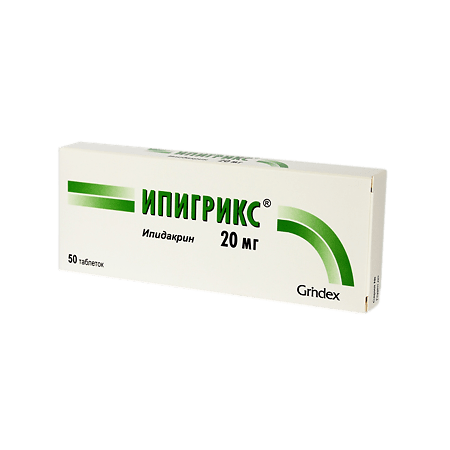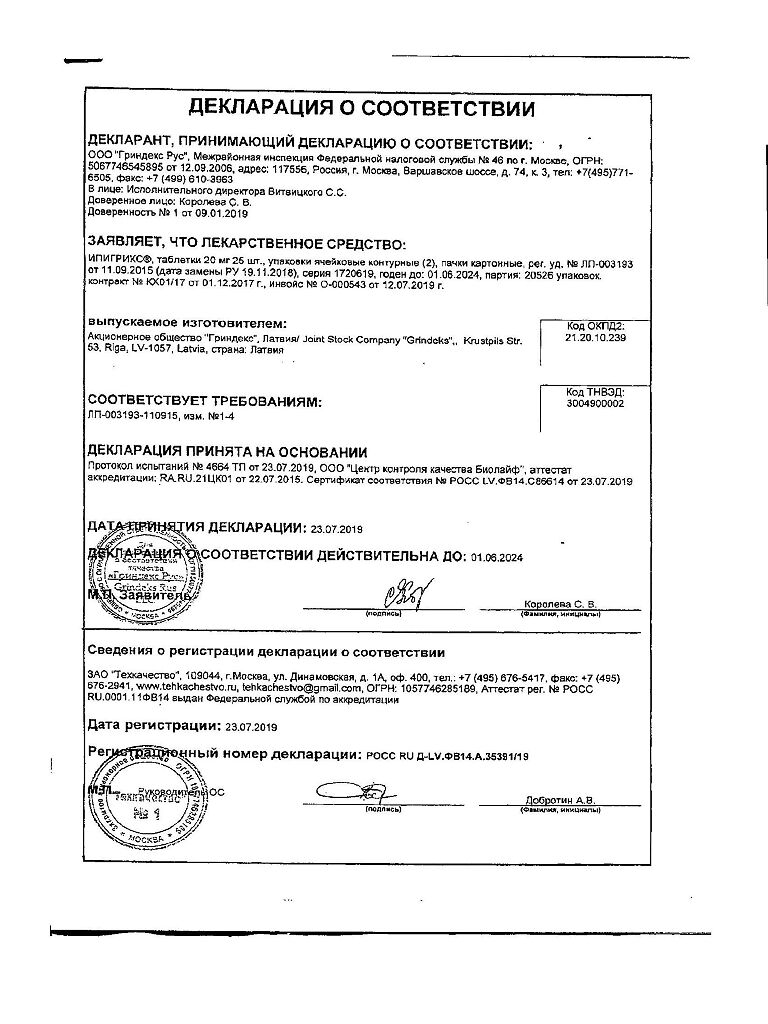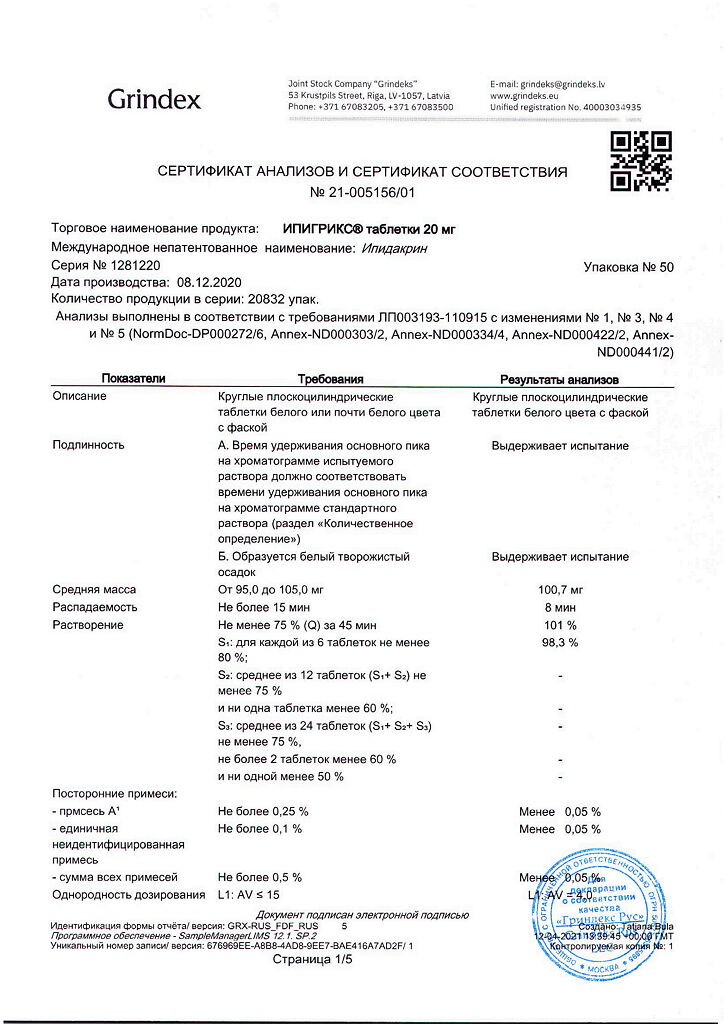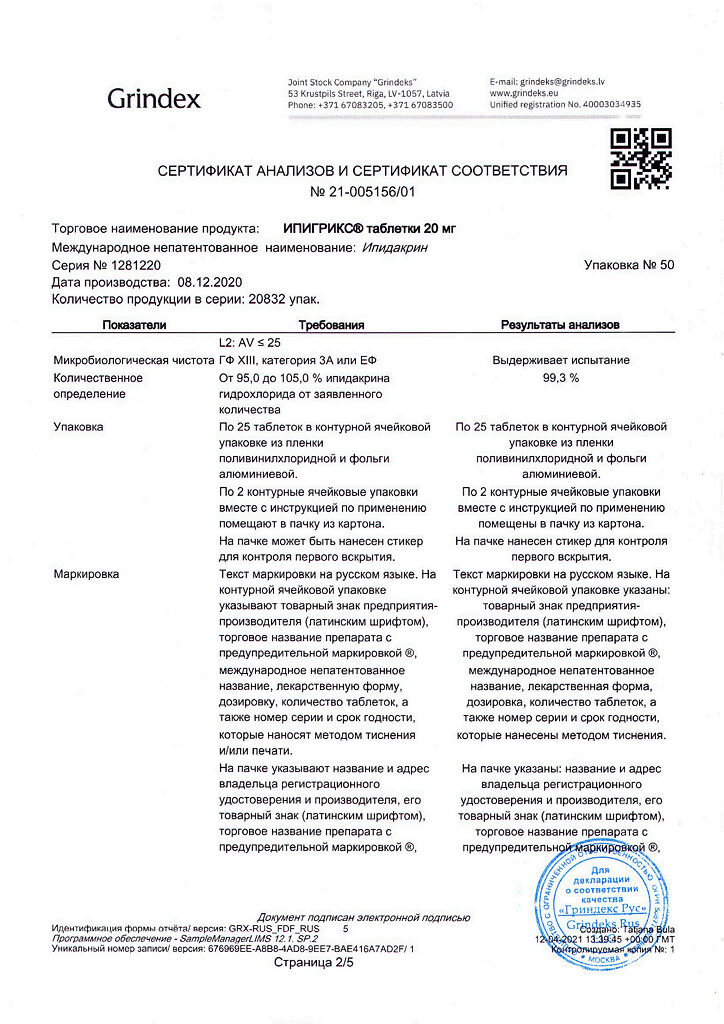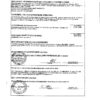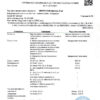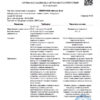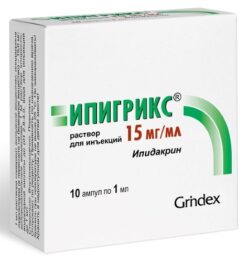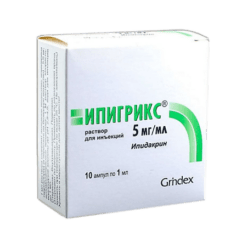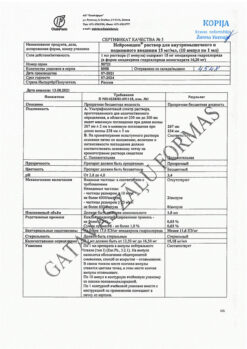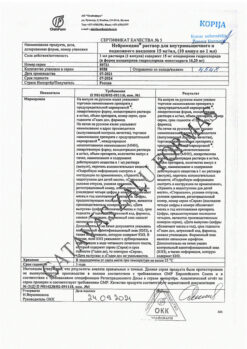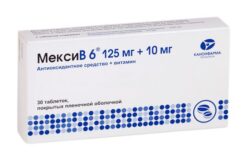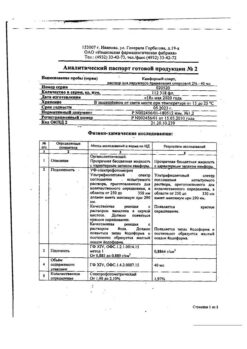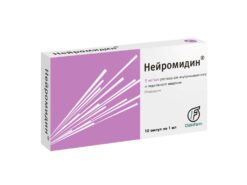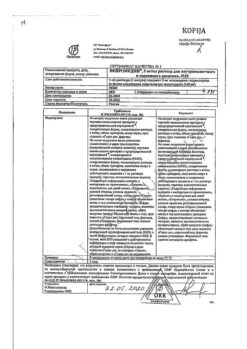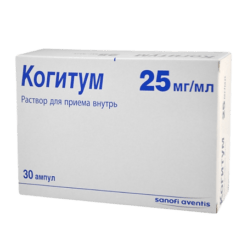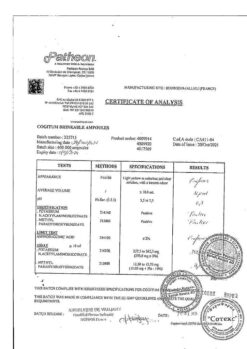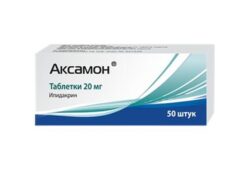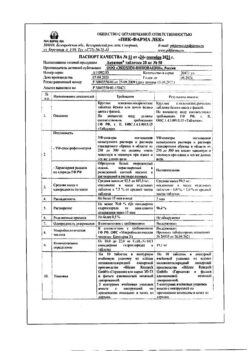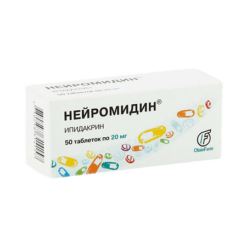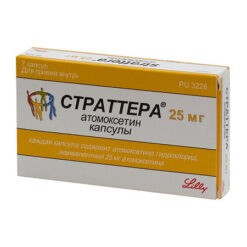No products in the cart.
Ipigrix, tablets 20 mg 50 pcs
€60.23 €56.94
Description
Pharmacotherapeutic group:
Anticholinesterase agents.
The ATC code: N07AA.
Pharmacological properties
Pharmacodynamics
Ipidacrine is a reversible cholinesterase inhibitor. It directly stimulates impulse conduction along nerve fibers, inter-neuronal and neuromuscular synapses of the peripheral and central nervous system (CNS). The pharmacological action of ipidacrine is based on a combination of two mechanisms of action:
- potassium channel blockade of neuronal and muscle cell membranes,
- reversible inhibition of cholinesterase in synapses.
Ipidacrine enhances the effect on smooth muscles not only of acetylcholine, but also of adrenaline, serotonin, histamine and oxytocin. It has the following pharmacological effects:
- restoration of impulse conduction in the peripheral nervous system after blockade caused by certain factors (e.g., trauma, inflammation, effects of local anesthetics, antibiotics, toxins and potassium chloride);
- recovery and stimulation of neuromuscular conduction;
- specific moderate stimulation of the CNS in combination with certain manifestations of sedation;
- enhancing the contractility and tone of the smooth muscles of the internal organs;
- improving memory.
In preclinical studies, ipidacrine had no teratogenic, embryotoxic, mutagenic, carcinogenic and immunotoxic effects and did not affect the endocrine system.
There are no sufficient data from clinical studies of the safety of ipidacrine in children.
Pharmacokinetics
Absorption
After oral administration, ipidacrine is rapidly absorbed from the gastrointestinal tract. Maximum plasma concentration is reached after one hour. About 40-55% of the active substance is bound to plasma proteins.
Distribution
The drug penetrates the blood-brain barrier. Imidacrine enters the tissues quickly, only 2% of the drug is in the plasma in equilibrium state. The half-life is 40 minutes.
Metabolism and excretion
The drug is metabolized in the liver. Excretion of ipidacrine is renal (through the kidneys) and extrarenal (through the gastrointestinal tract), excretion with the urine predominates (mainly by tubular secretion, only ? of the dose is excreted by glomerular filtration). The half-life of ipidacrine is 40 minutes.
Indications
Indications
Ipigrix is indicated for:
Diseases of the central nervous system: bulbar palsy and paresis, the recovery period of organic lesions of the central nervous system, accompanied by motor and/or cognitive impairment.
Diseases of the peripheral nervous system: mono- and polyneuropathy, polyradiculopathy, myasthenia gravis and myasthenic syndrome of various etiologies.
Treatment of intestinal atony.
Pharmacological effect
Pharmacological effect
Pharmacotherapeutic group:
Anticholinesterase drugs.
ATC CODE: N07AA.
Pharmacological properties
Pharmacodynamics
Ipidacrine is a reversible cholinesterase inhibitor. Directly stimulates the conduction of impulses along nerve fibers, interneuronal and neuromuscular synapses of the peripheral and central nervous system (CNS). The pharmacological action of ipidacrine is based on a combination of two mechanisms of action:
blockade of potassium channels in the membranes of neurons and muscle cells,
reversible inhibition of cholinesterase at synapses.
Ipidacrine enhances the effect on smooth muscles of not only acetylcholine, but also adrenaline, serotonin, histamine and oxytocin. Has the following pharmacological effects:
restoration of impulse conduction in the peripheral nervous system after blockade caused by certain factors (for example, trauma, inflammation, the action of local anesthetics, antibiotics, toxins and potassium chloride);
restoration and stimulation of neuromuscular conduction;
specific moderate stimulation of the central nervous system in combination with individual manifestations of sedation;
increased contractility and tone of the smooth muscles of internal organs;
memory improvement.
In preclinical studies, ipidacrine did not have teratogenic, embryotoxic, mutagenic, carcinogenic or immunotoxic effects, and did not affect the endocrine system.
There are no sufficient data from clinical studies on the safety of ipidacrine in children.
Pharmacokinetics
Absorption
After oral administration, ipidacrine is rapidly absorbed from the gastrointestinal tract. The maximum concentration in blood plasma is reached after one hour. About 40-55% of the active substance binds to blood plasma proteins.
Distribution
The drug penetrates the blood-brain barrier. Ipidacrine quickly enters the tissues; only 2% of the drug is in the plasma at equilibrium. The half-life of distribution is 40 minutes.
Metabolism and excretion
The drug is metabolized in the liver. Excretion of ipidacrine is carried out renal (through the kidneys) and extrarenally (through the gastrointestinal tract), excretion predominates in the urine (mainly by tubular secretion, only 1/2 dose is excreted by glomerular filtration). The half-life of ipidacrine is 40 minutes.
Special instructions
Special instructions
Precautions for use
There are no systematic data on use in children.
During treatment, alcohol should be avoided, which increases the side effects of ipidacrine.
Ipidacrine can aggravate the course of epilepsy, as well as increase the negative effects of alcohol on the body.
In patients with depression, ipidacrine may increase symptoms of depression.
Due to the possible risk of bradycardia when using ipidacrine, cardiac activity should be monitored.
IPIGRIX® tablets contain lactose, so patients with rare congenital galactose intolerance, Lapp lactase deficiency or glucose-galactose malabsorption should not use this drug.
Impact on the ability to drive vehicles and operate machinery
Ipidacrine may have a sedative effect, so patients exposed to this effect should be careful when using ipidacrine when driving or operating machinery.
Active ingredient
Active ingredient
Ipidacrine
Composition
Composition
Pills.
One tablet contains:
active substance:
ipidacrine hydrochloride monohydrate – 21.6 mg (in terms of ipidacrine hydrochloride – 20.0 mg);
excipients:
lactose monohydrate – 65.0 mg;
potato starch – 12.6 mg;
dried potato starch – 1.4 mg;
calcium stearate – 1.0 mg.
Contraindications
Contraindications
Do not use when:
Epilepsy.
Hypersensitivity to ipidacrine and/or to any of the excipients of the drug.
Angina pectoris.
Extrapyramidal disorders with hyperkinesis.
Severe bradycardia.
Bronchial asthma.
Vestibular disorders.
Exacerbation of stomach or duodenal ulcers.
Mechanical obstruction of the intestine or urinary tract.
Pregnancy and breastfeeding period.
Children under 18 years of age (no systematic data on safety of use).
With caution in: gastric and duodenal ulcers, thyrotoxicosis, diseases of the cardiovascular system, as well as in patients with a history of obstructive diseases of the respiratory system or acute respiratory diseases.
With caution:
lactase deficiency;
lactose intolerance;
lactose/isomaltose malabsorption syndrome, since the drug contains lactose.
Side Effects
Side Effects
Ipidacrine is usually well tolerated. Side effects are observed in less than 10% of patients and are mainly associated with stimulation of m-cholinergic receptors.
In the following, the listed side effects are classified according to groups of systems and organs, indicating the frequency of occurrence: often (≥1/100 to infrequently (≥1/1000 to rarely (≥1/10,000 to
Gastrointestinal disorders
Common: hypersalivation, nausea.
Uncommon: vomiting.
Rarely: diarrhea, epigastric pain.
Unknown: dyspepsia.
Nervous system disorders
Uncommon: dizziness, headaches, drowsiness, muscle spasms, weakness.
Cardiac dysfunction
Common: palpitations, bradycardia.
Visual disorders
Unknown: miosis.
Respiratory, chest and mediastinal disorders
Uncommon: increased bronchial secretion, bronchospasm.
Musculoskeletal and connective tissue disorders
Unknown: tremor, convulsions, increased uterine tone.
Skin and subcutaneous tissue disorders
Common: sweating.
Uncommon: allergic reactions (itching, rashes), usually when using large doses of the drug.
Interaction
Interaction
Ipidacrine weakens the inhibitory effect on neuromuscular transmission and the conduction of excitation along peripheral nerves by local anesthetics, aminoglycosides and potassium chloride.
The sedative effect of drugs that depress the central nervous system, including ethanol, as well as the effect of other cholinesterase inhibitors and m?cholinomimetic substances are enhanced under the influence of ipidacrine.
With simultaneous use of other cholinergic drugs, ipidacrine increases the risk of cholinergic crisis in patients with myasthenia gravis.
Beta-adrenolytic substances increase the severity of bradycardia caused by ipidacrine.
Cerebrolysin potentiates the action of ipidacrine.
Alcohol increases the unwanted side effects of ipidacrine.
Overdose
Overdose
Symptoms: in case of severe overdose, a cholinergic crisis may develop (decreased appetite, bronchospasm, lacrimation, increased sweating, constriction of the pupils, nystagmus, increased gastrointestinal motility, spontaneous defecation and urination, vomiting, jaundice, bradycardia, intracardiac conduction disturbances, arrhythmias, arterial hypotension, anxiety, anxiety, agitation, fear, ataxia, convulsions, coma, speech impairment, drowsiness, general weakness).
Treatment: symptomatic therapy is carried out, m-anticholinergic substances are used (including atropine, cyclodol, metacin, etc.).
Storage conditions
Storage conditions
Store at a temperature not exceeding 25 oC.
Keep out of the reach of children.
Shelf life
Shelf life
2 years.
Do not use after the expiration date stated on the package.
Manufacturer
Manufacturer
Grindeks JSC, Latvia
Additional information
| Shelf life | 2 years. Do not use after the expiration date stated on the package. |
|---|---|
| Conditions of storage | Store at a temperature not exceeding 25 oC. Keep out of reach of children. |
| Manufacturer | Grindex JSC, Latvia |
| Medication form | pills |
| Brand | Grindex JSC |
Other forms…
Related products
Buy Ipigrix, tablets 20 mg 50 pcs with delivery to USA, UK, Europe and over 120 other countries.

